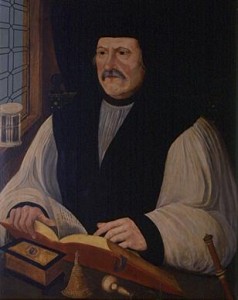 In 1558 Matthew Parker became Elizabeth I’s Archbishop of Canterbury. “What’s that got to do with Anne Boleyn and April 1536?”, you may well ask. Parker did not want the position, he did not believe that he was right for the post or fit enough to take it (he’d just suffered a nasty fall from a horse) and the only reason he did take it was because of a promise he’d made to Elizabeth I’s mother, Anne Boleyn, in April 1536 when he was one of her chaplains. Parker wrote to Sir Nicholas Bacon:
In 1558 Matthew Parker became Elizabeth I’s Archbishop of Canterbury. “What’s that got to do with Anne Boleyn and April 1536?”, you may well ask. Parker did not want the position, he did not believe that he was right for the post or fit enough to take it (he’d just suffered a nasty fall from a horse) and the only reason he did take it was because of a promise he’d made to Elizabeth I’s mother, Anne Boleyn, in April 1536 when he was one of her chaplains. Parker wrote to Sir Nicholas Bacon:
“[…] though my heart would right fain serve my sovereign lady the Queen’s majesty, in more respects than of mine allegiance, not forgetting what words her grace’s mother said to me of her, not six days before her apprehension, yet this my painful infirmity will not suffer it in all manner servings…”
He also referred to this promise in a letter to William Cecil, Lord Burghley, in 1572:
“Yea, if I had not been so much bound to the mother, I would not so soon have granted to serve the daughter in this place…”
We don’t know what exactly Anne had said to him six days before her arrest, around 26th April, but as Eric Ives points out “That charge, and the debt he felt he owed to Anne, stayed with him for the rest of his life.” It was enough of a promise for him to take a job that he didn’t want. Whatever Anne had said to him, he felt bound to serve and help her daughter. Did Anne Boleyn know that there was a plot against her? Was it just a coincidence that she spoke to Parker about this just days before her arrest? Was it just Elizabeth’s spiritual welfare she was talking about? We will never know because Parker does not give any more detail about the conversation.
Matthew Parker was a member of an influential group of men who were responsible for the future Elizabeth I’s education and for aiding in her subsequent rise to power, so Anne was putting her daughter in good hands. You can read more about these men and their influence in Robert Parry’s article The Cambridge Connections.
This is one of the events of Anne Boleyn’s fall which always moves me and makes me think that Anne knew exactly what was going on and that she needed to ensure that someone she trusted would be keeping an eye on her daughter. Yes, I may be reading far too much into this event but Anne’s words certainly had an impact on Parker. Interesting.
Also on this day in history…
- 1540 – Marriage of Francis Knollys and Catherine Carey, daughter of Mary Boleyn and William Carey, or, as some historians believe, Henry VIII.
- 1564 – Baptism of William Shakespeare at Holy Trinity Church, Stratford-upon-Avon. Shakespeare was the third son of John Shakespeare, a glover and whittawer, and Mary Arden, who lived in Henley Street, Stratford-upon-Avon.
Notes and History
- Parker, Matthew The Correspondence of Matthew Parker, D.D., Archbishop of Canterbury:
Comprising Letters Written by and to Him, from A.D. 1535, to His Death, A.D. 1575 (edited for the Parker Society by John Bruce, and Thomas Thomason Perowne, 1853), p59 and 391 - Ives, Eric (2004) The Life and Death of Anne Boleyn, Blackwell Publishing, p267